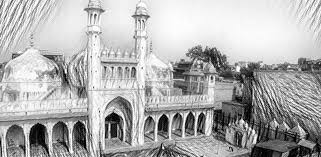
26-Nov-2024 , Updated on 11/27/2024 5:02:23 AM
Hidden Story of Places of Worship Act 1991: Sheltering Indian Mosque
The Places of Worship (Special Provisions) Act of 1991 is generally depicted as a measure to maintain communal harmony in India since it barred alteration of the existing status of places of worship.
However, the practice also has long and chequered past and current controversies that reveal its drawbacks, biases, and consequences. The Act was passed by the Congress government in 1991 to preserve the religious nature of worship places as it was on 15 August 1947. The law forbids the usage of any place of worship for one religion to be converted to another and compels the parties to a legal dispute over the place of worship's original ownership or its change to leave the matter unresolved.
Although on the face of it appears to be an assurance toward ensuring that no violence ensues, the Act has however been described to offer certain sections of the Indian population cover while at the same time turning its back on other sections, especially the Hindus in this particular encounter.
What Does the 1991 Act Say?
The law here, by its literal provision, states that no alteration of a place of worship shall be permitted if it was a religious place on the 15th of August, 1947. Moreover, if a mosque, temple, or any other religious place was in some form or the other present on that date, its status is to remain the same no matter who won the tyrant race of history or produced literature suggesting otherwise. The only part that was excluded under the Act was the continuing controversy over the site involving Babri Masjid and Ram Janmabhoomi.
The Background: Why Was It Enacted?
It was enacted by the Indian Parliament’s Congress government led by Prime Minister P.V. Narasimha Rao on the eve of the Babri Masjid demolition in December 1992. This was widely perceived as an effort to prevent other similar issues from leading to confrontation all over the country. However, critics have accused the government of passing the law without due consultation, and parliamentarians stated that passing a law will bring the significant change the government intended.
Some critics, including the Hindus and various right-wing organisations, have demurred on the relevant equity of the Act, as they deplored that it averted its gaze from several hundred years of forced conversions as well as the destruction of numerous Hindu temples by the invaders. It also does not allow the Hindu community any means of reparation of their historical grievances or restitution of their religious history.
Muslims Exploiting the Law?
Opponents of the Act have pointed to the fact that some Muslims have continued to go to court to make use of it to protect historical buildings that were converted into mosques against reforming Hindus. There is evidential data that backs up charges of many mosques being constructed after raiding and pulling down Hindu temples during invasions. Unfortunately, under the 1991 Act, Hindus cannot go to the courts for the recovery of these sites.
For example, the Kashi Vishwanath-Gyanvapi complex in Varanasi and the Krishna Janmabhoomi-Shahi Idgah dispute in Mathura are still pending because of those rules. The case is that these sites have tremendous religious value as shrines for Hindus; still, the Act does not allow for any concrete dealing to be made.
Purpose of the Passage of the Act by the Congress
Time and again, the Congress government has been criticised for appeasing the vote bank, and the Places of Worship Act is a classic case in point. It is widely believed that through the passage of this law during a session without adequate parliamentary proceedings, Congress has hurt the nation more for its narrow political considerations rather than serving justice to the historical wrongs. This comes even though the Act has far-reaching consequences, yet it receives little to no discussion.
The Hindus, who believe that their places of worship have rightly been taken over, have not been able to find their place on the right side of the ruling. Current law has been regarded as Congress party appeasement politics, which do not stop marginalising large sections of the population.
A Divisive Law
On the whole, the objective of passing the 1991 Act has not been fruitful in any way in respect of maintaining communal harmony. On the contrary, it has widened the existing rift between them. Some Indians perceive it as a legal problem that hinders those who want to right the historical injustices against them, while others ‘‘perceive it as a measure that protects them against the possibility of future pogroms.’’
The rigidity of the law has also caused a dilemma for the judiciary. Most grievance courts cannot base their verdict on a petition seeking a change of status of places of worship, no matter the amount of evidence presented to it. This simply perpetuates only bitterness and does not allow for communication.
Conclusion: Time to Revisit the Act?
The Places of Worship Act of 1991 was enacted to protect the secular character of India. The protests were successful, but their scale brought many things that a sect did not like, and many Hindus remained unsatisfied. The law has to be discussed and changed so that the stringency in the search for harmony complements the search for justice.
It is unimaginable that a country as diverse as India can help but deny its past and/or stifle true grievances. Real integration can only be experienced if the people in the different parts of the community believe that they have been heard and that their complaints have been listened to. The answer to this question still lies in the air: will the government have the guts to review this much-debated law again? Or is it going to persist in concealing the issues that never cease to pull the nation apart?

Student
hey there! i am a student currently pursuing my bachelors with a keen interest in writing., I am fueled by a deep love for storytelling and a flair for creating captivating narratives. Armed with a passion for language and a keen eye for detail, I strive to craft compelling copy that leaves a lasting impact.
Comments
Join Our Newsletter
Subscribe to our newsletter to receive emails about new views posts, releases and updates.
Copyright 2010 - 2026 MindStick Software Pvt. Ltd. All Rights Reserved Privacy Policy | Terms & Conditions | Cookie Policy